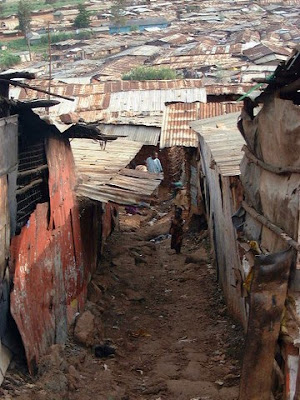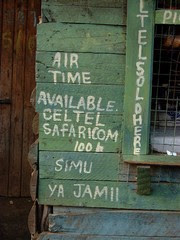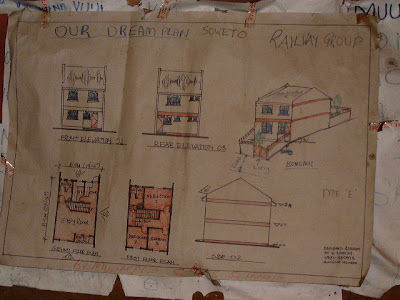
From: wikimedia.org
This slum in the middle of Nairobi in Kenya is reputed to be the biggest slum in the world with its population estimated to be up to 1.2 million. The mud-shacks are packed tightly: you can only get to the houses through the muddy alleys, cutting across black stagnant water now and then. Open spaces are full of litter. Most striking of all is the stench, what with piles of human faeces littering the ground.

Man’s knowledge of sanitation technology has improved by leaps and bounds since Mohenjo Daro 4000 years ago. But his wisdom in bringing the fruits of that knowledge to all his brethrens is still somewhat lacking!

From The Economist
Slums in sub-Saharan Africa are growing at more than 4% per year. They are attracted by the opportunities available in the city, and pushed out by the lack of prospects in the countryside. Kibera may be a dump, but it is cheap and anyone lucky enough to have a job in the city, can walk to work. Hawkers and casual labourers also benefit from next to the centre of Nairobi.
There have been sporadic efforts to improve the slums, but the “people of Kibera are suspicious of efforts to improve their housing. In the 1980s they saw some of their land taken for 400 new flats. No one in Kibera benefited, says Raphael Handa, a clergyman who heads a community committee set up with support from Habitat and the government; all the tenants were brought in from outside!”
David Smith of the Affordable Housing Institute was there in 2005, and he had this to say (with his pictures):
“Despite the self-reinforcing squalor of the homes, Kibera is also a hive of small business activity of every kind imaginable:
Pharmacy,
cell phone rentals, sewing in open air,
Open air shoe store (50 shillings is about USD 0.70).........baked in Kibera
Some of these businesses produce goods of surprising quality:
Furniture manufactured in Kibera
People make lives here:
The homes, when you step inside, are furnished with as much care as abject poverty can sustain.”
And they are not bereft of hope.

Sources: The Economist
Terra Viva
Related Posts: |
Social Bookmarking







1 comment:
People make their homes then love them no matter where and what conditions. Home is where the heart is.
Just wish that they could deal with the “flying bombs” better.
I enjoyed the article!
Kyle
Post a Comment